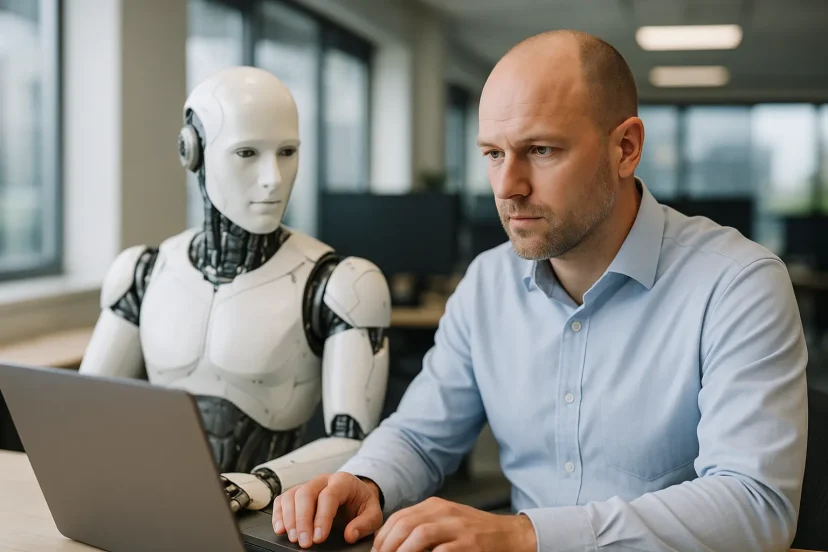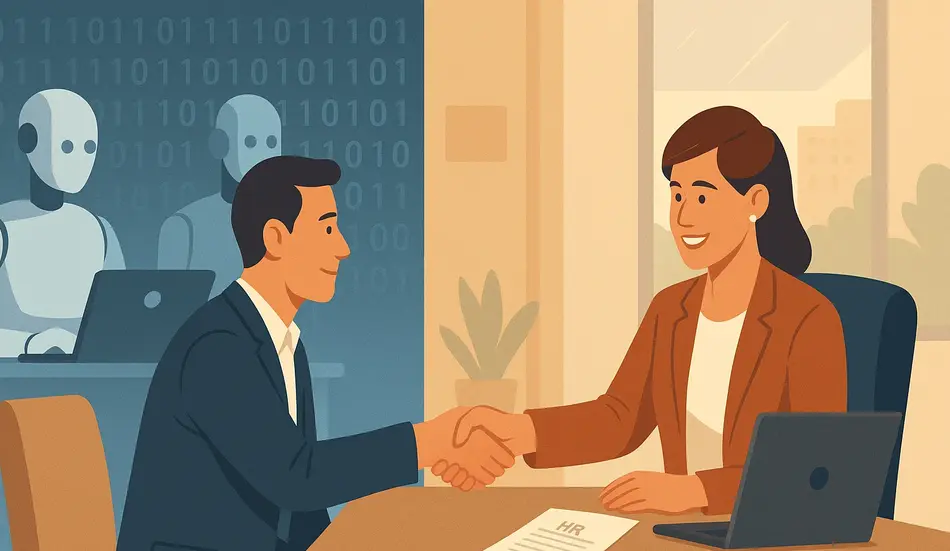AI in HR 2025 is reshaping how companies recruit, evaluate, and manage talent but not without resistance. Artificial intelligence (AI) has entered nearly every corner of the modern workplace, and human resources (HR) is no exception.
But despite the buzz, HR leaders across industries are pumping the brakes. They argue that while AI can handle repetitive tasks, it cannot replicate the empathy, fairness, and nuanced judgment required in hiring and employee management. In fact, over-reliance on algorithms risks legal battles, workplace disengagement, and reputational damage.
As one HR executive recently told the Financial Times: “AI can optimize, but only humans can humanize.”
The Rise of AI in HR: What to Expect in 2025
Over the last five years, AI adoption in HR has accelerated. Companies now routinely deploy tools that:
- Screen résumés at scale, filtering out applicants lacking required keywords.
- Conduct initial outreach using AI-driven chatbots to answer common questions.
- Schedule interviews across multiple stakeholders automatically.
- Analyze video interviews for tone, word choice, and body language.
For organizations inundated with applications—especially in sectors like retail, healthcare, and tech—AI saves significant time and money. According to Gartner, 67% of HR departments in the U.S. now use AI-based recruitment tools in some form.
The attraction is obvious: faster processing, reduced recruiter workloads, and lower hiring costs.

What AI Gets Wrong
Despite these advantages, AI in HR has a glaring flaw: it lacks context. Algorithms are only as good as the data they’re trained on, and hiring data often reflects decades of bias.
- Bias Amplification: AI systems have rejected female candidates for tech roles because past hiring data skewed male.
- False Negatives: Qualified applicants can be excluded simply because their résumé doesn’t match the algorithm’s preferred keywords.
- Cultural Blind Spots: AI cannot assess qualities like resilience, teamwork, or creativity—traits often central to long-term success.
A famous case involved Amazon scrapping its AI recruiting tool after discovering it discriminated against female applicants for engineering jobs. That example still resonates in HR circles as a cautionary tale.
The Case for Humans
AI might crunch data, but hiring is about people, not just patterns. HR leaders argue that several aspects of recruitment demand human oversight:
- Empathy: Understanding a candidate’s personal journey, motivations, and struggles requires human connection.
- Judgment: Deciding if someone is the right “fit” for a team involves weighing intangibles AI cannot measure.
- Fairness: Humans can identify when an algorithm’s recommendation appears biased or discriminatory.
- Legal Compliance: Employment law in the U.S. requires nondiscrimination, something companies risk violating if they blindly follow AI.
“An algorithm can rank résumés, but it cannot look someone in the eye and understand their passion for the work,” notes an HR director at a Fortune 500 company.
Risks of Over-Automation
Over-reliance on AI in HR isn’t just ineffective—it can be dangerous.
- Legal Risks: Biased AI hiring systems can expose companies to lawsuits under civil rights and labor laws.
- Reputation Damage: Stories of unfair AI-driven rejections spread quickly online, deterring future talent.
- Workplace Disengagement: Employees hired through impersonal, algorithm-heavy processes often feel less connected to their employer.
- Bad Hires: By ignoring “soft signals” of candidate potential, companies may miss out on top talent.
A 2024 Harvard study found that companies heavily reliant on automated hiring saw employee retention drop by 12% within two years.
Hire Smarter—Balance AI with Human Insight
Post your job on WhatJobs and reach candidates through a platform that values people, not just algorithms—helping you avoid bad hires and reputation risks.
Post a Job Now →Toward a Hybrid Future
Despite the challenges, AI is not going away. Instead, HR leaders are moving toward hybrid systems that combine machine efficiency with human oversight.
- AI as First Filter: Algorithms handle résumé scanning and scheduling.
- Human Oversight: Recruiters validate AI outputs and make final decisions.
- Continuous Monitoring: HR teams audit algorithms to ensure compliance and fairness.
- Employee Experience: Humans lead onboarding and culture-building, areas where empathy is critical.
This “AI + human” model is becoming the gold standard. It balances speed with fairness and reduces recruiter burnout without outsourcing judgment to machines.
Industry Examples
- Tech: Google and Salesforce use AI to streamline candidate outreach but rely on human recruiters for interviews and final evaluations.
- Finance: JPMorgan employs AI for compliance screening but ensures human officers validate key decisions.
- Retail: Walmart uses AI for shift scheduling but maintains human managers for workforce engagement.
These examples reflect a growing consensus: AI is a tool, not a replacement.
Find Your Place in AI-Enhanced Industries
Search WhatJobs for opportunities in tech, finance, and retail—roles where AI supports hiring, but human skills still make the difference.
Search Jobs Now →The Global Perspective
While the U.S. debates HR automation, other regions are setting the tone:
- European Union: The EU’s AI Act requires strict transparency in recruitment AI tools. Companies must disclose when an algorithm is used in hiring decisions.
- Asia: In Japan and South Korea, where AI adoption is widespread, companies face cultural pressure to maintain strong human-to-human hiring interactions.
- Global Employers: Multinationals must navigate a patchwork of rules, forcing many to err on the side of human oversight.
This patchwork underscores a universal reality: trust in hiring still rests with humans.
FAQ: HR and AI
Q1: Can AI completely replace HR recruiters?
No. While AI can handle repetitive tasks, the human element—empathy, fairness, and judgment—remains irreplaceable.
Q2: Why are HR leaders cautious about AI?
Because AI can amplify bias, create legal risks, and overlook critical human traits in candidates.
Q3: What are the risks of using AI alone in hiring?
Biased hiring decisions, lawsuits, poor cultural fit, lower retention, and reputational damage.
Q4: How are companies blending AI and human input?
By using AI for efficiency (like résumé screening) but leaving final decisions, interviews, and onboarding to humans.
Conclusion
AI may be transforming the HR function, but it is not replacing it. Instead, it is pushing recruiters and managers to redefine their roles—away from paperwork and toward human-centered decision-making.
The future of HR is not “AI vs. humans,” but AI with humans. Machines will handle efficiency, but people will continue to handle trust, empathy, and culture.
At its core, hiring is about people, and no algorithm can replace that simple truth.




